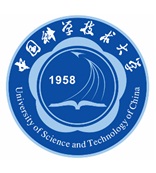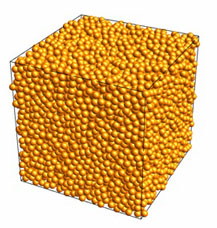 |
Theoretical Soft Condensed Matter Physics Study at University of Science and Technology of China 2011, Volume 6, Number 1 |
|---|
The theoretical soft condensed matter physics group led by Professor Ning XU at Department of Physics, University of Science and Technology of China was founded in early 2010. Prof. Xu, who has been active in the frontiers of soft condensed matter physics for over five years, was recently selected by the Hundred Talent Program of the Chinese Academy of Sciences. Soft condensed matter physics is still developing in China. The mission of the group is to contribute to the prosperity of the soft matter study in China by fostering young scientists, promoting national and international communications and collaborations, and directing national scientific projects.
The research in the group is currently focused on the understanding of the physical properties of amorphous systems such as glasses, colloidal suspensions, and granular materials. Due to the disorder of their structures, these amorphous systems exhibit complicated behaviors that cannot be successfully explained by existing theories. For instance, the elusive glass transition, one of the main topics that the group is working on, is a long-standing and one of the most challenging problems in condensed matter physics. Because of the similarities among different amorphous systems, jamming, a simplified concept to unify the liquid-solid transition of amorphous systems, has been applied widely and attracted more and more attentions. It has been shown that some elusive thermal and structural properties of low-temperature glasses could be explained by the physics of jamming. The study of jamming and its applications to various amorphous systems is one of the key research projects in the group.
The present research topics include the glass transition, jamming transition, and their connections, properties of glasses and other jammed solids, dynamics of supercooled liquids approaching the glass transition, rheology of amorphous systems under shear, self assembly of colloidal suspensions, disorder effects on structural and vibrational properties of colloids, and jamming and glass transition of polymers. More topics concerning soft matter in biological physics and material sciences would be studied in the future. Because of the complexity of the amorphous systems, computer simulations are powerful in providing evidence to explain experimental observations, make predictions, and help the development of theories. Basic techniques applied by the group include molecular dynamics simulations, Monte-Carlo simulations, and optimizations methods. Meanwhile, new simulation techniques will be developed to deal with complicated and novel problems.
The group owns a powerful DELL computer cluster which consists of 16 nodes of 8 dual core processors. More nodes will be added successively to satisfy the growth of the computational needs.  The research was recently funded by the National Natural Science Foundation of China, and will be supported by the Hundred Talent Program of the Chinese Academy of Sciences next year. The group has set up close worldwide collaborations with both theorists and experimentalists from universities such as University of Pennsylvania, University of Chicago, Yale University, University of Cambridge, Chinese University of Hong Kong, Hong Kong University of Science and Technology, and Nanjing University.
The research was recently funded by the National Natural Science Foundation of China, and will be supported by the Hundred Talent Program of the Chinese Academy of Sciences next year. The group has set up close worldwide collaborations with both theorists and experimentalists from universities such as University of Pennsylvania, University of Chicago, Yale University, University of Cambridge, Chinese University of Hong Kong, Hong Kong University of Science and Technology, and Nanjing University.
See: http://phys.ustc.edu.cn/5szdw/xuning.html